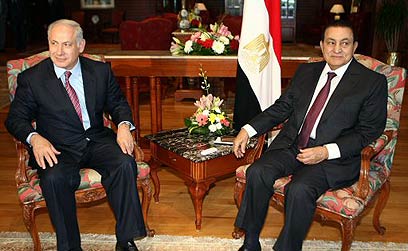
Netanyahu to Mubarak: Hope talks with PA will resume soon
In his first trip abroad since taking office, Israeli PM tells Egyptian president Jerusalem hopes to resume talks with Palestinians in coming weeks; says peace with Egypt a 'strategic asset' and 'cornerstone of stability in Middle East. Mubarak: We discussed need to rehabilitate Gaza
SHARM EL-SHEIKH – Prime Minister Benjamin Netanyahu met Monday afternoon with Egyptian President Hosni Mubarak in the resort town of Sharm el-Sheikh, on the backdrop of joint interests in the battle for the future of the Middle East and disagreements on the nature of relations with the Palestinians.
"We want to renew the peace negotiations with the Palestinians as soon as possible, and I hope they will indeed resume in the coming weeks," the Israeli leader told a joint press conference after meeting Mubarak, adding that he viewed peace with Egypt as a "strategic asset" and "the cornerstone of stability and hope in the region".
"The peace between us (Israel and Egypt) has existed for more than 30 years and has withstood the test of time," the PM said, "We wish to expand it, first of all to our neighbors the Palestinians. We want Israelis and Palestinians to live side by side with a horizon of peace, security and prosperity."
This was Netanyahu's first trip abroad since taking office, and it was held exactly one week before his planned meeting with US President Barack Obama in Washington.
The Israeli leader told told reporters that Israel was grateful to Egypt for its assistance "in the fight against extremists and terrorists who threaten the entire region and the peace we all wish for. The Jewish nation strives for harmonious relations with the Muslim world, and the State of Israel strives to achieve peace with its Palestinian neighbors and all the Arab countries. We all live in this region and we are all the sons of Abraham.
"Unfortunately, today we are witnessing extremist forces threatening the stability in the Middle East," Netanyahu said, "The battle in the Middle East is not one between nations or religions, but between moderates and extremists. It is a battle between those who want to live and those who spread violence and death. We want to nurture and build, while others want to burn, destroy and kill.
"Seeing that Israel and Egypt are looking to build a future of hope and peace, we must strengthen the cooperation between us," the Israeli PM said.

'Fight against extremists.' Netanyahu (L) and Mubarak (Photo: AFP)
Mubarak said after his face-to-face meeting with Netanyahu that the Israeli PM "expressed his government's commitment to promoting peace, while I expressed Egypt's hope that his government live up to its commitment regarding the two-state solution and the advancement of the Arab peace initiative.
"During these talks some important issues were raised, including the settlements and the threat they pose to peace," the Egyptian president said, "We also spoke of the need for the establishment of an independent Palestinian state that will exist alongside Israel in peace and security," he said.
Mubarak said the two leaders also discussed "the need to strengthen the ceasefire in Gaza (between Israel and Hamas), to open the Gaza border crossings and rehabilitate the Strip."
According to the Egyptian president, these steps will lead, among other things, to a prisoner exchange deal that would see kidnapped Israeli soldier Gilad Shalit freed in exchange for the release of hundreds of Palestinian prisoners.
"Three decades have past and it has been proven that peace is not impossible," Mubarak said.
"Peace is achieved by the few who stand by their obligation to abide by the agreed upon resolutions. Egypt seeks a just and comprehensive peace that would put an end to the bloodshed and violence, also between the Israelis and Palestinians."
Officials at the Israeli Embassy in Egypt said at the start of the visit that it had been harshly criticized by opposition members. This criticism also made its way to newspapers' coverage of the preparations for the visit.
Among other things, the opposition newspapers called on Netanyahu to go back to Israel, and on Mubarak not to greet the "leader of an extreme right-wing government."
In the past 24 hours the Egyptian government has been trying to tone down the criticism, and the main message of the state media outlets, or those influenced by the Cairo government, is much more moderate. One of the publications stated that the Egyptians should listen to Netanyahu first and, if needed, criticize him later.
The prime minister was accompanied by Industry, Trade and Labor Minister Binyamin Ben-Eliezer. This was Ben-Eliezer's first visit to Egypt since being criticized for commanding Israel Defense Forces soldiers who allegedly killed Egyptian hostages during the Six-Day War.
Ben-Eliezer helped Netanyahu prepare the visit to Sharm and is seen as a type of "tone softener" towards the Egyptian regime, being a member of the Labor Party.
According to a member of Netanyahu's delegation to Egypt, Ben-Eliezer said the PM realizes that a peace agreement with the Palestinians based on the two states for two peoples principle is inevitable.
"There is no other formula," Ben-Eliezer was quoted as telling Egyptian officials.
The Israeli official said that during his meeting with Mubarak Netanyahu did not go into the details of the peace process and did not discuss a future Palestinian state.
The prime minister himself described the meeting as "excellent," but admitted that he and the Egyptian president disagreed on a number of issues.










